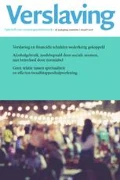Samenvatting
‘Blended’ behandelen is een behandelmogelijkheid waarbij face-to-face behandelcontacten worden gecombineerd met online interventies (zoals opdrachten en coaching). Het toepassen van blended behandeling geniet toenemende populariteit in de geestelijke gezondheidszorg. De implementatie ervan is echter geen sinecure. Dit ervaart ook Brijder Verslavingszorg in haar poging om een blended variant van de cognitieve gedragstherapie voor alcohol-, cannabis- en drugsgerelateerde klachten, alsmede voor pathologisch gokken structureel te integreren in het behandelaanbod. In dit artikel wordt het implementatieproces van de blended cognitieve gedragstherapie bij Brijder belicht. Tevens worden de resultaten uit een exploratief onderzoek gepresenteerd, dat tot doel heeft inzicht te geven in de doelmatigheid van deze vorm van behandelen, in vergelijking met de traditionele face-to-face behandeling. Het exploratieve onderzoek suggereert dat het aanbieden van de blended cognitieve gedragstherapie in minder behandeltijd tot dezelfde behandeluitkomsten leidt, wat betreft symptomatisch herstel van cliënten. Daarnaast lijken cliënten die bij Brijder Verslavingszorg in behandeling komen deze vorm van behandelen meer te waarderen dan cliënten die uitsluitend face-to-face behandeling hebben ontvangen. Ook geven de resultaten aanwijzingen dat de focus bij de implementatie en structurele implementatie in de dagelijkse behandelpraktijk zal moeten komen te liggen op het ondersteunen en stimuleren van de behandelaar om blended behandeling actief aan te bieden aan de cliënt en deze vorm van behandelen uit te voeren.
Abstract
In blended mental health treatment, face-to-face contacts between the client and the therapist are combined with online interventions, such as online exercises and online coaching. Despite the growing enthusiasm in the mental health care sector to develop blended mental health treatments, structural integration in daily mental health care practice is hard to achieve. Brijder, a Dutch mental health care institution for the treatment of addiction disorders, has also experienced the difficulties of implementing a blended version of an evidenced-based protocol of cognitive behavioral treatment (blended CGT) for alcohol, cannabis and other drug related disorders, as well as for pathological gambling in daily treatment practice. In this paper we discuss the implementation process of blended CGT at Brijder and present results of an explorative study aimed at giving insights in the expediency of blended care compared to the traditional face to face treatment. Results of the explorative study suggest that blended CGT leads to the same treatment outcome, as far as symptomatic recovery is concerned, in less treatment time. Furthermore, clients who receive the blended CGT seem to appreciate the treatment more than clients who are treated traditionally face to face. Results also indicate that in the implementation process of blended care, the organization has to focus on supporting, facilitating and stimulating the therapist to actively offer clients blended CGT and treat them with blended CGT.

Literatuur
GGZ Nederland (2014). Handreiking eHealth in de praktijk. Tips en handvatten voor implementatie van eHealth in de ggz. http://www.ggznederland.nl/uploads/assets/Handreiking%20implementatie%20eHealth%20in%20de%20ggz%20DEF.pdf. Geraadpleegd op: 13 april 2016.
Lambert, M. J., & Shimokawa, K. (2011). Collecting client feedback. Psychotherapy (Chic), 48(1), 72–79.
Mair, F. S., May, C., O’Donnell, C., Finch, T., Sullivan, F., & Murray, E. (2012). Factors that promote or inhibit the implementation of e‑health systems: an explanatory systematic review. Bulletin of the World Health Organization, 90(5), 357–364.
PARC (2017). Kerncijfers Brijder 2016 Noord- en Zuid-Holland. Den Haag: PARC.
Ruwaard, J., & Kok, R. (2015). Wild west eHealth: time to hold our horses? European Health Psychologist, 17(1), 45–49.
Schippers, G., Broekman, T., & Buchholz, A. (red.). (2011). MATE 2.1 Handleiding en protocol. Nederlandse bewerking. Nijmegen: Beta Boeken.
Schippers, G. M., Smeerdijk, M., & Merkx, M. J. M. (2014). Handboek cognitieve gedragstherapie bij middelengebruik en gokken. Utrecht: Perspectief.
Shimokawa, K., Lambert, M. J., & Smart, D. W. (2010). Enhancing treatment outcome of patients at risk of treatment failure: meta-analytic and mega-analytic review of a psychotherapy quality assurance system. Journal of Consulting and Clinical Psychology, 78(3), 298–311.
Wildt, W. A. J. M. de (2006). Leefstijltraining 2 alcohol, middelengebruik en gokken. Handleiding trainer. Amsterdam: Boom Cure & Care.
Zorginstituut Nederland (2013). Werkinstructies voor de CQI Kortdurende ambulante GGZ &VZ. https://www.zorginstituutnederland.nl/binaries/content/documents/zinl-www/kwaliteit/toetsingskader-en-register/de-cq-index/cqi-vragenlijsten/cqi-vragenlijsten/cqi-vragenlijsten/zinl%3Aparagraph%5B12%5D/zinl%3Adocuments%5B4%5D/1312-werkinstructies-voor-de-cqi-kortdurende-ambulante-ggz-en-vz/Werkinstructies+voor+de+CQI+Kortdurende+ambulante+GGZ+en+VZ.pdf. Geraadpleegd op: 22 april 2016.
Zorgvisie (2016). Niels Chavannes zet vraagtekens bij e‑health. https://www.zorgvisie.nl/ict/nieuws/2016/6/niels-chavannes-zet-vraagtekens-bij-e-health. Geraadpleegd op: 12 juli 2017.
Dankbetuiging
De auteurs danken het zorgbedrijf Brijder van de Parnassia Groep voor de medewerking aan het onderzoek en dr. Hein Sigling, specialismeleider Verslaving bij de Parnassia Groep, en mr. drs. Els A.M. Govers, directeur Zorg Brijder, voor tekstueel commentaar op het artikel.
Author information
Authors and Affiliations
Corresponding author
Rights and permissions
About this article
Cite this article
van Orden, M., den Hollander, N. Herstelgerichte ‘blended’ cognitieve gedragstherapie voor cliënten met verslavingsproblematiek. Verslaving 14, 66–78 (2018). https://doi.org/10.1007/s12501-018-0153-2
Published:
Issue Date:
DOI: https://doi.org/10.1007/s12501-018-0153-2

